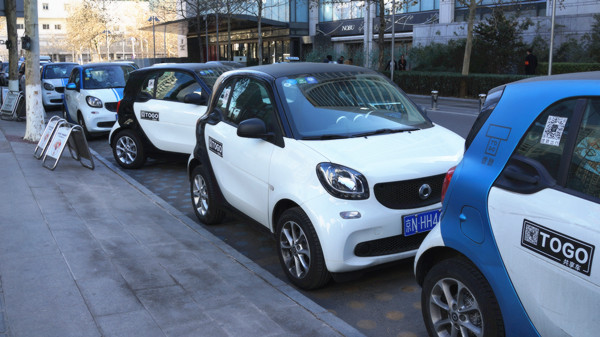TOGO, more than rental cars
china.org.cn / chinagate.cn by Wei Jia, December 16, 2016 Adjust font size:
Apart from public transport, taxi and ridesharing apps like Didi Chuxing, commuters in Beijing have another option to get from A to B. TOGO, a Beijing-based tech company, launched its car2go-inpired service in China's capital in August 2015.
They have more than 100 service areas across the city and 300-plus cars composed mostly of Smart Fortwos, a rear-engine, rear-wheel-drive, 2-seat hatchback city car, which is also the most used car with the Germany-based car2go platform. In addition, TOGO has recently put into service a few Citroën C3-XRs, a sports utility vehicle.
TOGO provides its users with easy location and reservation of those cars through its app. Thanks to the unmatched convenience in accessing and returning the vehicle in the city, TOGO has amassed more than 30,000 registered users in Beijing. About 20,000 new users register every month. These users are composed of mostly young white-collar workers commuting between their homes and business districts in the city.
|
|
|
TOGO cars parked at the Beijing Central Business District on Dec. 9. [Photo by Wei Jia / China.org.cn] |
According to Kevin Luo, from TOGO's marketing department, TOGO is aiming for an "all-around experience."
"Our users drive TOGO cars to work in the morning, and since a lot people skip breakfast, we are offering cakes and coffee in our cars for three days from Dec. 14. For users feeling the munchies in the afternoon, TOGO cars provided coupons for places like Starbucks and Love Yogurt in past joint promotions. After a day's work, our users will find chocolate and nuts in their TOGO cars in an upcoming campaign, which are both great to quench your hunger without making you feel full," Luo said. These amenities are quite handy when you are stuck in Beijing's notorious traffic.
"We put fashion magazines such as GQ in our cars too," said Luo. "Once a user left us a message on WeChat telling us she liked one of the magazines so much that she took it home and would return it later."
TOGO Club is an important part of this culture of sharing. Apart from information about fun events organized by TOGO and coupons offered in partnerships with well-known brands, TOGO asks members about their views on the company and to publish articles in its monthly e-magazine. Articles don't have to be automotive related, but span a whole range of lifestyle topics.
"TOGO is the first car-sharing company that put such an emphasis on its users' lifestyle," said Luo. "We want to project a human image and to be as close to our users' lives as possible so that people don't think of TOGO only when they are going out."
The similarities between TOGO and car2go are as striking as their differences. By giving the social function of its app a prominent role to play, TOGO is looking to solidify its specific user base in Beijing by giving them more than cars that are few clicks away. For those eager for the TOGO experience, they do not need to envy those working in the traditionally more glamorous regions of the city for long. Luo said that there would be 1,000 TOGO cars, a three-fold increase, by early next year in Beijing.
